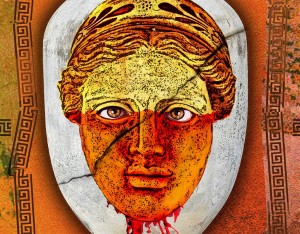
The Classical Greek Theatre Festival with Westminster College Theatre Department performed Sophocles’ comedy, Electra, at de Jong Hall Monday, Sep. 21, 2015. Dr. Keith Engar and Dr. Jim Svendsen founded the festival in 1971.
This year marks the festival’s 45th annual production. The 10-member cast included professional actors and Westminster students. Translators Marianne McDonald and J. Michael Walton wrote the script in American English and used many contemporary phrases.
The play opens with Orestes and his tutor plotting revenge for Orestes’ father. The oracle at delphi tells Orestes to accomplish it by deceit, so he asks his tutor to go and tell Orestes’ family that he is dead, setting up the comic irony.
The tutor depicts a gruesome tale to Orestes’ mother and sister, Electra. The play then proceeds to have Orestes arrive in disguise, carrying an urn of his ashes. The sight causes Electra to grieve and nearly kill herself before Orestes dumped the fake ashes and revealed his identity.
Director Larry West described the humor as “very dark.”
“We find ourselves laughing at death,” West said.
Melanie Nelson played the title role. She graduated from Southern Utah University for her BA, and Southern Methodist University for her MFA. She worked with Larry West in the past.
“She has an energy and a passion that is very much like Electra,” West said of Nelson. “I knew she could carry the show.”
West said moderation does not occur to Electra, so Nelson portrayed extreme sorrow and rage and extreme joy in the same production.
“Afterwards, I’m exhausted,” Nelson said. “While it’s happening, I’m not tired at all because so much is going on.”
The production combines classical and contemporary elements. Blue graffiti vandalizes a white foam Grecian pillar. A drummer plays modern percussion to add dramatic affect to certain scenes. Costumes range from classical Greek gowns and traditional folk-wear, to modern, with sunglasses and smartphones as props. The costumes for the three chorus members represent three generations, and are based on My Big Fat Greek Wedding, according to West.
“I wanted it to feel Greek, not Greek our time but Greek throughout time,” West said.
Founder Jim Svendsen expounded on the themes in Electra during a free lecture in de Jong Hall before the performance. He addressed the Greek concept, “dike,” which means “justice.”
Svendsen said each person in the audience would define justice differently.
“It’s a slippery concept,” Svendsen said.
Clytemnestra argues in the play that murdering Agamemnon was “just” because Agamemnon sacrificed their daughter to the gods. Electra countered that Agamemnon did not want to do it, but had no choice. Therefore, justice called for the death of her father’s murderers, Clytemnestra and her lover, Aegisthus
Nelson said one could agree with either of them. As Electra, she did not consider whether or not Clytemnestra was right, but Nelson personally admitted Agamemnon was ruthless and would do anything to win a war.
“Nobody’s blameless,” Nelson said.
Another major theme Svendsen explained was respect and grief for the dead.
“If there’s one thing Greeks know how to do, they know how to grieve,” Svendsen said.
The translators left three Greeks words in the script that Greeks would use when mourning their the dead. The words are meaningless, but the translators wanted those ancient sounds in the play, according to Svendsen.
The play concludes as Orestes kills both his mother and her lover, Aegisthus, who together killed Agamemnon, and closes with Electra crying over her mother’s corpse. The cast lined up and did a traditional Greek dance and bows. The quote from “Zorba the Greek” inspired West’s decision to end the play this way:
“But it was the dancing, only the dancing that stopped the pain,” West quoted.




